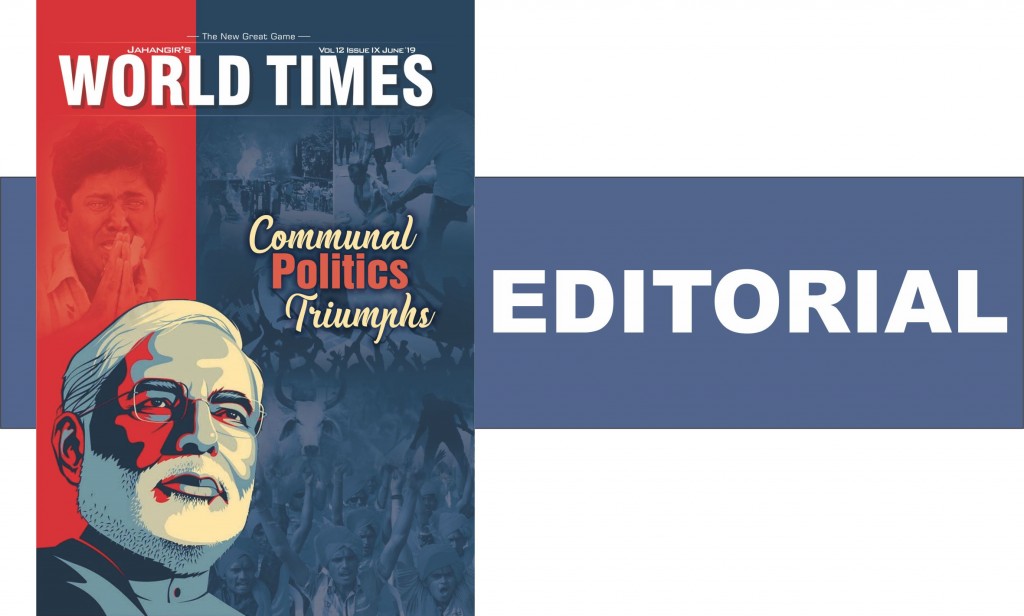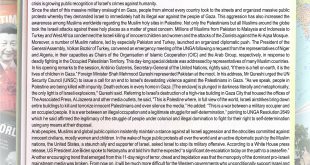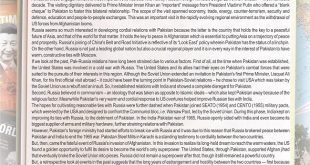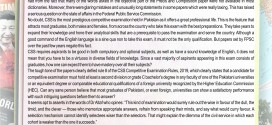Testing Times Ahead!
With the surge of populist, nationalist leaders, especially in countries that are of key importance to world affairs, there were considerable apprehensions that peace of the world would be at stake. The policies such leaders expounded on, and steps they took, bode ill for the future of the world. The biggest example of such a ‘patriot’ leader is the US President Donald J. Trump. Since America takes pride in being the ‘leader of the free world, President Trump vowed to ‘Make America Great Again’. Posing a daunting challenge to the postwar world order, he tried to run world affairs as per his own whims. His policies manifested as stubborn, ‘my way or the highway’ approach as he tried to make the world bow down before the US hegemony. Whether it is his view on Nato or the igniting of a dangerous trade war with China, or even his Middle East policy, he acted like a monocrat.
During the recent months, President Trump has intensified his war of tariffs with China. On 10th May, he increased tariffs from 10 percent to 25 percent on 200 billion US dollars of Chinese goods. Moreover, as an arm-twisting tactic, his administration added Huawei – the world’s second largest smartphone maker – to its “entity list,” which bans the company from acquiring technology from US firms without government approval. However, after getting a befitting response from China in the form of retaliatory imposition of tariffs on American goods, he extended an olive branch and said that he will meet Chinese President Xi Jinping at the G20 gathering in Japan where his discussion with President Xi will be “very fruitful,” and hinted that Huawei could be a part of any trade agreement with Beijing. “If we made a deal, I could imagine Huawei being possibly included in some form or some part of it,” he said.
With a relative calm on this front, President Trump has now set his eyes on the Middle East – the region that has already borne a heavy brunt of America’s oil wars. On the one hand, he wants to strangulate Iran with crushing economic and trade sanctions, while he is out, on the other, to impose his so-called ‘Deal of the Century’. The sole purpose of all his manoeuvrings is to protect the illegitimate state of Israel from any danger. To achieve this objective, a US aircraft carrier, the USS Abraham Lincoln, is lurking off the Iranian coast in the Persian Gulf, sending out a message of aggression. Meanwhile, in the Levant, his administration is all set to roll out his version of the peace plan for the Israelis and the Palestinians.
The US wants to subdue Iran so that it does not remain a potent threat to Israel, and Saudi Arabia, a key US ally in this region. And, this all is being done by maligning Iran due to its nuclear programme, although the International Atomic Energy Agency (IAEA) has confirmed, in its quarterly report distributed to member states in February this year, that Iran has remained within the key limits on its nuclear activities imposed by its 2015 deal with world powers, despite growing pressure from newly-reimposed US sanctions. The US intelligence assessments, too, reached a similar conclusion, and in the 2019 Worldwide Threat Assessment, Director of National Intelligence Dan Coats assessed that “Iran is not currently undertaking the key nuclear weapons-development activities … to produce a nuclear device.”
But despite that Trump is making all-out efforts to corner Iran. Arab countries have also aligned with the United States. However, given the fact that a proxy war between Iran and Arabs is also underway in Yemen, Syria and Iraq, there is a strong likelihood that the situation would not escalate further and in the wake of strong resistance from the Iranian side, both sides will stay away from raising the escalation levels. However, given President Trump’s mercurial nature, one can expect anything. So, with an earnest hope that sanity prevails in this issue, we must also be ready to get embroiled in yet another war imposed by the United States.
The second biggest development in the past few days has been the victory of Narendra Modi’s BJP in 2019 general election in India, which has further reinforced a global trend of rightwing populists sweeping to victory. Surprisingly, Modi wave surged once again to such an extent that his Bharatiya Janata Party (BJP) single-handedly won a clear majority to form the government in the centre for the next five years – BJP-led alliance won 348 out of 542 seats up for grabs, up from the 282 it won in 2014.
The months leading up to Mr Modi’s campaign were marked by anti-Muslim and anti-Pakistan rants, with India going so far as to escalate tensions by claiming to have conducted the so-called Surgical Strikes 2.0 inside Pakistan in order to whip up nationalist sentiment. So, Modi’s victory means that communal politics has triumphed in India, the world’s largest democracy, in an age that will define the future of the Indian republic. Since opposition parties have a marginal share of seats in Lok Sabha, the lower house of Indian parliament, they will practically be no hurdle in Modi’s way.
Now that the elections are over, we hope that Mr Modi will rein in his rhetoric that had encouraged Hindu extremist groups to step up their intimidation of minorities. And the focus must turn to a practical way forward for sustainable peace in the Subcontinent. This is possible solely through an unwavering commitment to dialogue, an offer Pakistan has extended — and India has rebuffed — consistently.
As a goodwill gesture, Prime Minister Imran Khan, on May 26, congratulated Narendra Modi on his election victory and expressed his desire for both countries to work together for the betterment of their peoples. It is an encouraging sign that the Indian premier, too, reciprocated that by sharing his Pakistani counterpart’s vision of fighting poverty together. However, much would depend on a change in attitude on the part of India, whose hawkish behaviour has been the main obstruction in the quest for peace. The optimism might not be altogether misplaced but it must be followed by a sincere policy shift.
 Jahangir's World Times First Comprehensive Magazine for students/teachers of competitive exams and general readers as well.
Jahangir's World Times First Comprehensive Magazine for students/teachers of competitive exams and general readers as well.



